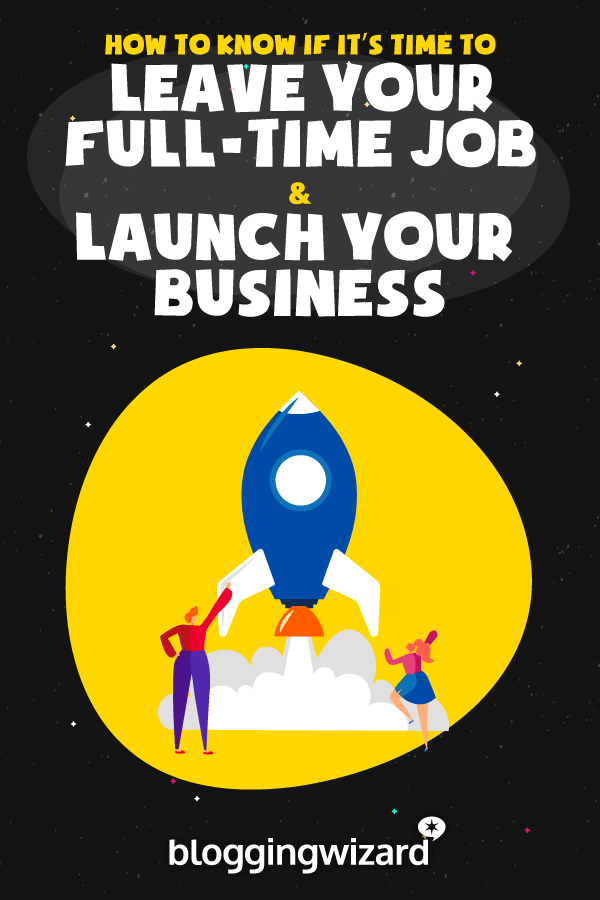How To Know If It’s Time To Leave Your Full-Time Job & Launch Your Business

Let me set the scene: you’ve got a side hustle, and you’ve been working on it long enough for you to have generated a fairly reliable supplement income.
You’re building your side hustle alongside your full-time job, but you’ve reached an impasse: you want to scale your hustle up, but you simply don’t have the time.
So, there’s a decision to make: do you keep your side hustle as it is, adding to your income but stagnating forever as a ‘side’ hustle rather than a thriving business? Or do you take the leap and leave your full-time job?
Finding the right time to leave your full-time job and frog leap fully into the world of entrepreneurialism is not easy. It’s a huge risk, and if you’ve been stuck in a similar situation to the one I’ve outlined above for a while, you’re sensible to be not taking this decision lightly.
That being said, for most of us there will never be a golden window in which there is the perfect opportunity to leave our full-time jobs.
When I started my own freelance business, there was always an element of risk in finally deciding to leave my full-time job – but I had put in enough groundwork to feel somewhat comfortable taking that jump.
Below are a few sure signs that it might be time to leave your full-time job and take your business to the next step.
1. You’re generating a reliable income from your side hustle
The gap between full-time employee and self-employed business owner becomes a lot less intimidating when you’ve got your business to a point where it’s generating a fairly predictable, regular monthly income.
When I first set up my freelance writing business, I didn’t even consider leaving my full-time job until I had several quality clients keeping me on a monthly retainer, ensuring I had a consistent, somewhat stable (as stable as freelancing can be!) income.
How much of an income should you be generating before you leave your full-time job? Honestly, that totally depends on your circumstances.
If you have a mortgage, children, or significant debts to pay off, you will probably want to be more cautious. If, on the other hand, you have no real ties, you might have more freedom to take a bigger risk.
2. You have a comfortable amount of money saved to support you
Maybe your business is generating a fairly stable income – but not enough to support you. With limited time to invest in your business, it’s going to be difficult (or take a long time) to get to the point where your side income matches what you make at your full-time job.
However, if you are generating a comfortable income and have built up a significant savings buffer that could support you for the next few months while you really focus on taking your business to the next level, it could be time to leave your full-time job.
Again, how much money you should have saved before you leave your job is entirely dependent on your circumstances – but you should realistically be able to support yourself with your savings for the next couple of months, as well as enough money to give you time in case you need to rethink your business plan.
3. You want to scale up your business (and have a plan to do so) but don’t have the time
If your business is at the point where all you need to grow it is time, but all your time is taken up in your full-time job, it might be time to consider leaving. I worked long hours when first setting up my business: evenings and weekends were spent in front of my laptop, and a social life was a far off notion!
At some point, somethings gotta give. Your business will get to the point where you’re losing money because you can’t commit more time to it – either that, or you’re going to get burnt out. Money can always be made, after all, but you can’t make more time.
If your business is at the point where you really need more time in order to help it to grow, leaving your full-time job might be what it takes to give you the time to really dedicate to scaling up your business.
4. You’ve talked to other business owners & got a back-up plan
Take advantage of the fact that there are many people out there that have left full-time employment, launched a business, and failed. Or succeeded. Accepting the fact that you might fail is so important.
Talking to someone who has failed at some point, who had to have a back-up plan and rethink their strategy can be invaluable.
Get an insight into other peoples experiences and through that, create a back-up plan in case your business takes longer to grow than you expect, in case it fails completely, or in case your savings run out.
These things can happen, and while maintaining a positive outlook is great, it’s better to have a realistic strategy in place should the worst happen.
5. You feel ready
No one can tell you “now is the time to leave your full-time job”. Sometimes, you’ve just got to take the leap.
What I would say, though, is that you need to feel mentally prepared to dive into self-employment.
Being completely self-employed requires extreme productivity, discipline, long hours with sometimes little reward, the ability to think creatively and solve problems quickly, and a willingness to wear a lot of different hats – and learn new skills constantly.
It’s not easy, and you need to be emotionally and mentally prepared for the stress that comes with relying on your own business for your income, because those first couple of months are going to be especially stressful.
If you can read all of the above, acknowledge it, and accept it – well, maybe it’s time to take a deep breath and go all in.

